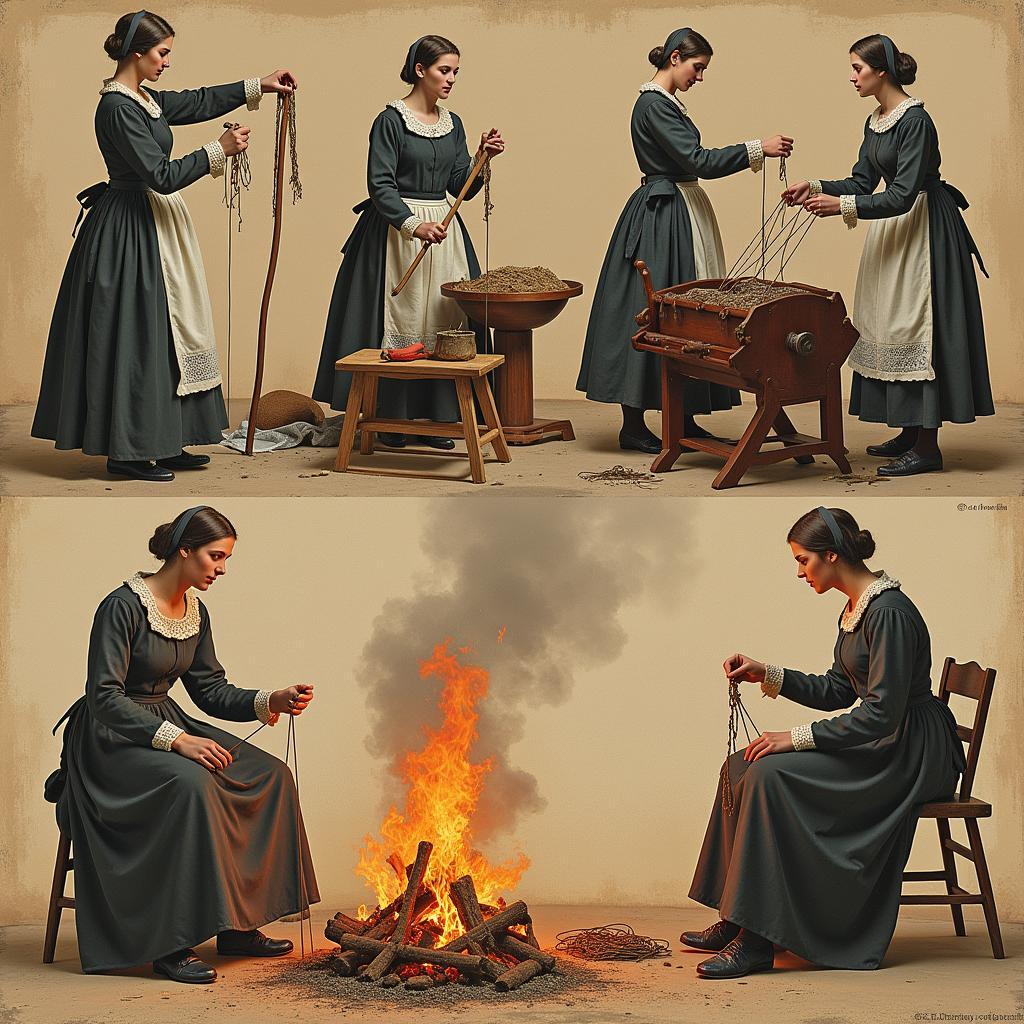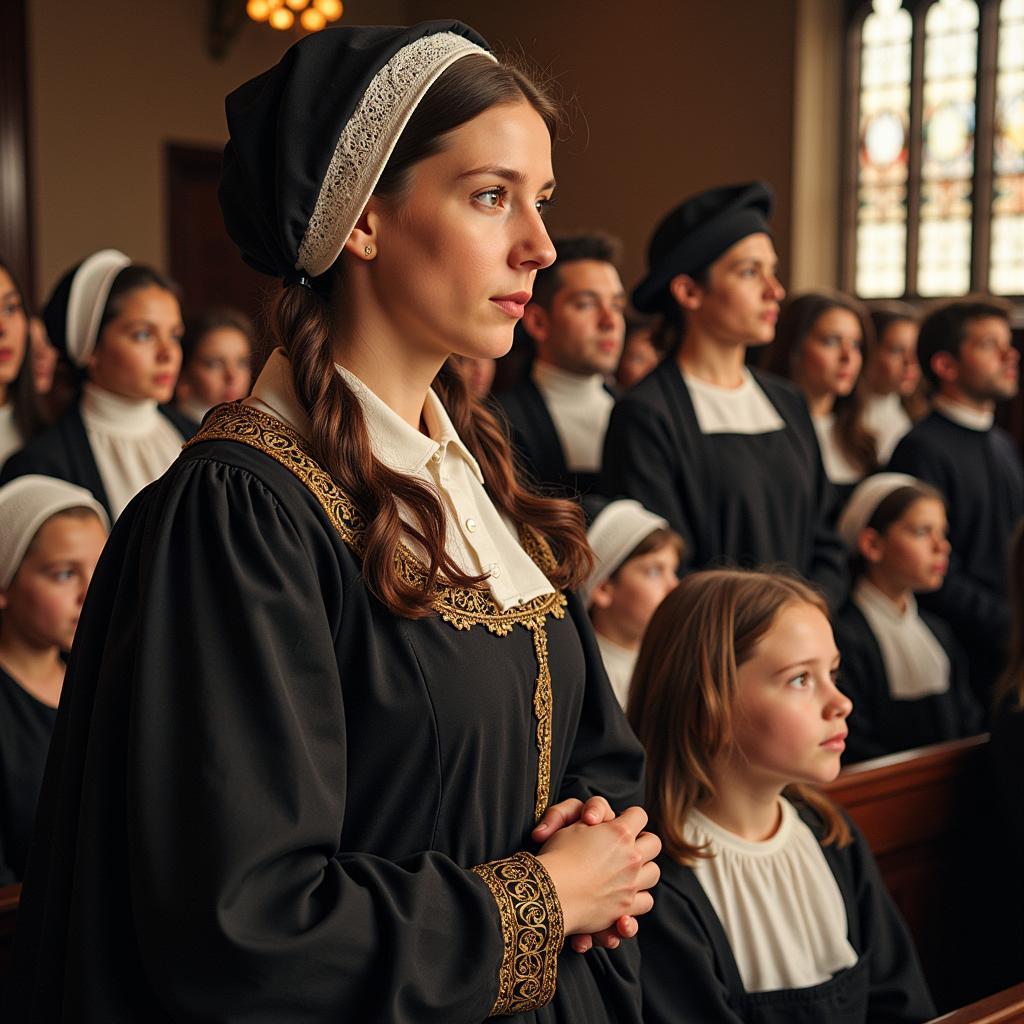Women in 17th-century Puritan society occupied a complex and often misunderstood role. Their lives were deeply shaped by religious doctrine, social expectations, and the practical realities of a challenging new world. Understanding how women were seen in Puritan society requires examining not just the prescribed ideals, but also the lived experiences that often diverged from those ideals.
The Ideal Puritan Woman: Piety, Submission, and Domesticity
The Puritan worldview emphasized a hierarchical social order, with God at the apex, followed by men, and then women. Women were expected to be pious, submissive to their husbands, and focused on domestic duties. Religious devotion was paramount, and women were expected to be models of Christian virtue, diligently studying the Bible and attending church services. Their primary role was within the home, managing the household, raising children, and supporting their husbands’ endeavors. This ideal of the “goodwife” emphasized her contributions to the family’s spiritual and material well-being. Education for women was primarily focused on reading and writing for religious purposes, rather than intellectual pursuits.
The Reality: Divergence from the Ideal
While the ideal of the submissive and domestic woman dominated Puritan discourse, the realities of life in colonial America often required women to step outside these prescribed roles. Economic necessity, the demands of survival in a new environment, and the sheer workload within the household meant women were actively involved in various aspects of community life. They contributed to the family economy through gardening, spinning, weaving, and other domestic industries. In the absence of their husbands, due to travel or death, women often took on greater responsibilities, managing farms, businesses, and even legal matters. These experiences provided women with a degree of agency and influence that often contradicted the prescribed ideal of passive submission.
 Puritan Woman Performing Domestic Chores
Puritan Woman Performing Domestic Chores
Women and Religion: A Central Role in the Puritan Community
Despite their subordinate social status, women played a vital role in the religious life of Puritan communities. They were expected to uphold the moral standards of the community and to instill religious values in their children. Church attendance was mandatory, and women’s piety was considered essential for the spiritual health of the family and the community as a whole. While they were excluded from formal leadership positions within the church, women often exerted influence through their involvement in charitable activities, religious education, and informal networks of support within the community.
Challenges and Hardships: Navigating Puritan Society
Life for Puritan women was filled with challenges. High rates of childbirth mortality, the constant threat of disease, and the hardships of life in a new and often hostile environment took a toll. Social expectations of piety and submission could also be restrictive, limiting women’s opportunities for self-expression and autonomy. Furthermore, women who deviated from the prescribed norms of behavior faced social censure and even accusations of witchcraft. The Salem witch trials stand as a stark reminder of the dangers faced by women who challenged or were perceived to challenge the established order.
 Puritan Family Attending Church Service
Puritan Family Attending Church Service
Were Women Seen as Equal to Men in Puritan Society?
No, women were not seen as equal to men in Puritan society. Puritan beliefs emphasized male headship within the family and the broader community. Women were considered subordinate to men in all aspects of life, from religious and social roles to legal and economic matters. This inequality was rooted in theological interpretations of scripture and reinforced by social norms and legal structures.
How Did Puritan Beliefs Affect Women’s Lives?
Puritan beliefs profoundly affected women’s lives, shaping their roles, expectations, and opportunities. The emphasis on piety, submission, and domesticity defined the ideal Puritan woman, while the realities of life in colonial America often required women to adapt and take on roles beyond the domestic sphere. The strict moral code and social surveillance within Puritan communities could be both supportive and restrictive, offering a sense of belonging while simultaneously limiting individual freedom and autonomy.
Conclusion
Understanding how women were seen in Puritan society requires a nuanced perspective that acknowledges both the prescribed ideals and the lived experiences of women in 17th-century New England. While the ideal of the pious, submissive, and domestic woman dominated Puritan discourse, the realities of life in the colonies often required women to demonstrate resilience, resourcefulness, and a degree of agency that challenged these prescribed limitations. Exploring this complex interplay between ideal and reality offers valuable insights into the lives of women in Puritan society and their contributions to the shaping of early American history.
FAQ
- What was the ideal role of a woman in Puritan society? The ideal Puritan woman was expected to be pious, submissive to her husband, and focused on domestic duties.
- Did Puritan women have any education? Yes, but their education was primarily focused on reading and writing for religious purposes.
- What challenges did Puritan women face? They faced challenges such as high childbirth mortality rates, disease, and restrictive social expectations.
- Were all Puritan women confined to domestic roles? No, economic necessity and other factors often required women to take on roles beyond the domestic sphere.
- Were Puritan women allowed to participate in church leadership? No, women were excluded from formal leadership positions within the church.
- How did the Salem witch trials affect women in Puritan society? The Salem witch trials highlighted the vulnerability of women who deviated from social norms.
- What can we learn from studying the lives of Puritan women? We can gain insights into the complex interplay between religious ideals, social expectations, and the lived experiences of women in early America.
Suggested further reading:
- The Puritan Family
- Women and Religion in Early America
When you need support, please contact Phone Number: 02043854663, Email: [email protected] Or visit us at: Area 34, Bac Giang, 260000, Vietnam. We have a 24/7 customer service team.